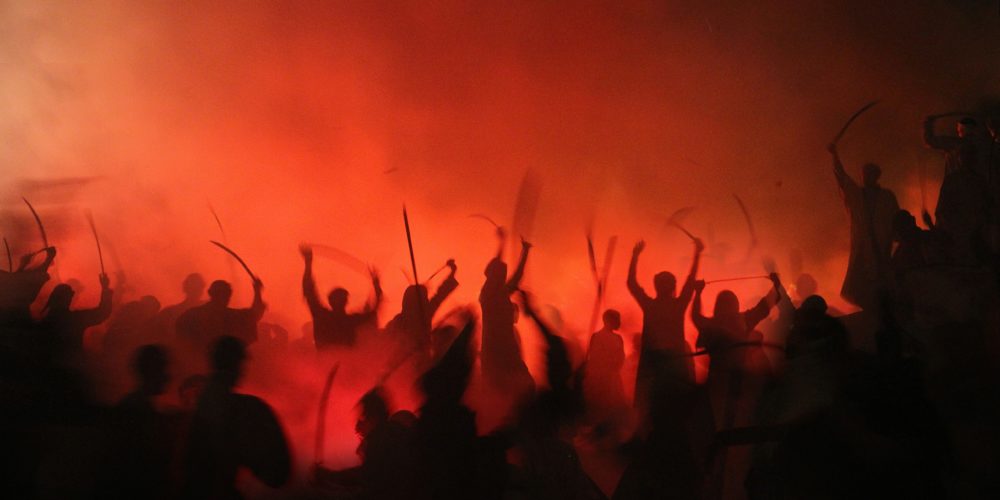If you find yourself in a hateful mob, you’re being played

Here’s what those who believe in Covid-19 vaccinations believe about the “anti-vaxxers:”
That they are gullible and swayed by manipulative messaging; and that they will regret their decision.
Here in turn is what anti-vaxxers believe about vaxxers:
That they are gullible and swayed by manipulative messaging; and that they will regret their decision.
No diehard member of any group believes that they are actually in the wrong. No, they believe they are wholeheartedly correct in their beliefs. It is those others who are wrong. Demonstrably, unequivocally wrong. For most people, facts don’t come into it. They are in a belief system, and they must never falter in their beliefs.
When two religious groups fight, each one thinks it is fighting the heathens on behalf of the One True God. When fans of rival soccer teams hurl insults at one another about the superiority of their style of play, they are not led by evidence, just blind conviction. When neighbouring countries fight over territory, each one thinks its case is just, and the other’s is bogus.
Each groups wallows in smug superiority. Yet the only way through is to use reasoned, open-minded, non-judgmental discourse.
I wrote last week that groups and groupings are the hallmark of the human being. We gather ourselves according to religious belief, skin-colour, mother tongue, and arbitrary lines on maps. Once grouped, we fight for our people—sometimes to the death. Our great strength—cooperation—is also our great weakness, for we extend that cooperation to only very narrow groups.
Identity-based hostility is one of the hallmarks of the human being. But must we stay like this for all of eternity? Is there a way out? One might imagine that formal education would offer hope. But no, identity politics and inter-group hostility seems to be just as strong in the highly educated. The economic historian Carlo M Cipolla posited that the tendency to cause harm to others while achieving no benefit to oneself is independent of characteristics such as education. In other words, the proportion of people willing to damage their own interests while attacking others is the same in the uneducated as in PhD holders.
What to do, then? The only way out is for the minority—those not handcuffed to group interests—to step up. Those who can see the lunacy of this situation cannot just accept it. The few who can see beyond artificial boundaries and contrived differences have to speak their truths plainly and resist stereotypes and discrimination wherever possible, and set an example of wider kinship in their own daily behaviours.
Better awareness will come from understanding three things about our groups. First, where did our particular story of “us” and “them” come from? Trace its origins and you will find it is based on myth, and that the other side has a near-identical story in which your people are the villains.
Second, who benefits from this constant amplification of difference and suspicion? Divide and rule is a timeless tactic used by bad leaders. Making divisions more ugly is a practice straight from the playbook of the budding fascist. Look out for leaders who make you afraid of other groups, who ask you to put them in power so that they can protect you. Baying mobs rarely assemble themselves; they are manipulated into being by a select few. Those in the crowd rarely benefit from their outrage; those who create the crowd are the ones who gain both power and riches. So: if you’re in the mob, you’re being played.
And lastly, this very personal question: am I willing to participate in my own diminution as a human, simply to feel superior to others? Do I expand the possibilities of the people around me, or shrink them? We have one planet, and we are one species. We may look a little different and speak distinctively and cook our foods in nonidentical ways—but that is the great joy of being human. In essence we are all very similar—we have the same brains and tap into the same emotions in our lives. The differences are around the edges, in the multitude of tongues, attire, art and cuisines we can concoct. Those differences are what bring exotic colour and variety to our lives, and should be celebrated.
The example of tolerance, acceptance and curiosity is what needs to be seen more often. If you are able to regard human diversity as both interesting and endearing, don’t hide that light; shine it everywhere. Show it in your actions and behaviours, and slowly others may see the wisdom of looking beyond contrived boundaries and deranged animosities.

Buy Sunny Bindra's new book
The X in CX
here »
Popular Posts
- My books of the yearDecember 14, 2025
- Here’s why you should become foolishNovember 30, 2025
- Confessions of an explaining personDecember 7, 2025
- How to listen, really listenNovember 16, 2025
- Is AI hiring your company into oblivion?November 23, 2025















